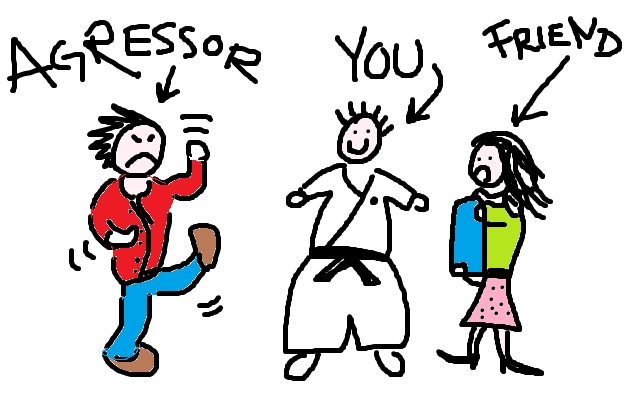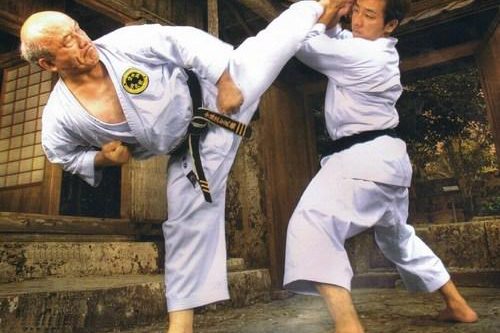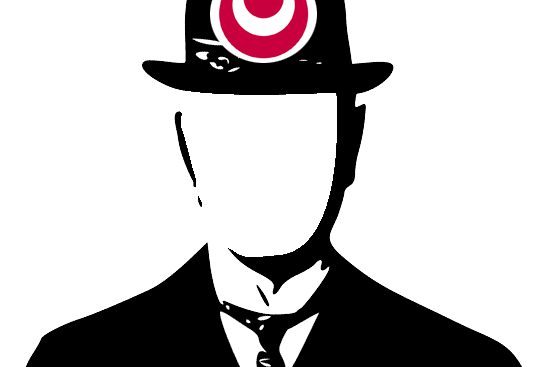Have you ever used your Karate to defend yourself?
What about somebody else?
Although Karate has historically been primarily focused on defending oneself from physical danger, the skills of Karate can relatively easily be employed in a wide variety of settings; including the protection of other people or property (both of which can be considered self-protection in extension).
As an example, one of the most legendary historical figures of Karate, Matsumura Sokon sensei (whose weapon I once discovered in Okinawa) was the chief martial arts instructor for the Okinawan king Sho Ko, but also the official royal bodyguard. Matsumura served in this capacity for both of the last two Okinawan kings, Sho Iku and Sho Tai, eventually earning him the local reputation of a ‘bushi’, or ‘noble warrior’.
In fact, Matsumura was one of the most influential Karate exponents of his era – his list of notable students read like a Who’s Who of Karate history.
And he was a bodyguard!
In other words, Karate actually has a well recorded history of not only being a self-defense art aimed at protecting oneself, but also other people.
Cool, huh?
So here’s the million yen question:
When was the last time you practised this in the dojo?
When was the last time you actually practised, or even thought about practising, the tactics and techniques needed for defending or aiding other people (like your loved ones or random victims of physical street violence)? For most people, the answer to that question would simply be “never”.
You never practise how to use Karate for defending or helping people other people than yourself.
And that, my friend, is a problemo.
Which I aim at solving today, with some help from my colleague Doc Rogers.
Doc Rogers is the author of Corporate Executive Protection – A Manual for Inspiring Corporate Bodyguards and president/CEO of International Corporate Executive Protection Ltd. Doc has earned a Ph.D. in Security Administration from Southwest University and is Southeast Asia’s leading expert on executive protection and corporate security.
In other words, he is a modern-day bodyguarding expert grandmaster sensei warrior.
And today he has agreed to help me help you, by granting me permission to share his ten golden rules for people who want to learn self-protection of other people (bodyguarding) even better. These rules, or commandments if you will, consist of basic yet highly valuable advice that many Karate people often overlook when it comes to the grand concept of self-defense (i.e. are you going to the movies with your family? Check out the area the day before, take note of fire exits, opening/closing times, fastest routes etc.). Simple stuff that could save you a lot of headache.
Of course, these ten rules were originally written for professional bodyguards (and may contain a bit advanced language) but nonetheless I think there is something to learn for everyone here.
Just pretend you are Matsumura sensei, protecting the king of Okinawa…
It could prove valuable one day.
Here we go:
The 10 Commandments of Executive Protection
By Doc Rogers
1. Showing up early within the area of operation is key to becoming more effective. These days advance work is being pushed aside and is not given the proper importance or time requirement needed. Showing up at least one day early at the area, on your own time, will cost you a little additional expense. However, the rewards will be twin-fold in terms of getting your job accomplished. If you believe in the old saying that 80% of success is just showing up, than 90% is showing up early for your advance work assignments.
2. Concentrating on your clients’ safety and security. It goes without saying that bodyguards have to concentrate on the protection of their clients. To be protective you must have the ability to stay on target and focus on the core task at hand. Productive bodyguards keep in this protective groove every step of the way. They maximize protective focus and attentiveness. Productive bodyguards are purposeful, not distracted.
3. Obtain the clients itinerary as early as possible. Once you obtained the itinerary go over it with a fine tooth comb. If there are agendas or meetings that you are not sure about, contact the individuals who will be conducting the meeting or event. Talking personally with these individuals is worth its weight in gold. You’ll learn the fine details, get access to how the meeting or event will unfold. This all helps in the protection process and makes you more productive on the day of the event. You can brief your client on the specific movements within the venues, etc.
4. Obtaining VIP passes and parking as early as possible. When planning for an important event for your client, get you and your client’s entry passes as well as VIP parking well in advance. Never assume they will issue your VIP passes and parking on the day of the event, as this could become disastrous. To become more productive, meet with the event manager in charge of VIP passes and parking well in advance and you’ll be squared-away.
5. Booking your client’s and your hotel room way in advance. Your room needs to be adjacent to the client’s room, with a fully booked hotel this little requirement could pose a major problem. Make your reservations in advance; speak with the manager of the rooms division of the hotel. If you use the particular hotel on a regular basis, develop a professional relationship with this person. Remember the hotel is considered the client’s home away from home, it’s their castle. The less hassles for you and the client while staying at the hotel the better, this can be accomplished by developing a good working relationship with the managers.
6. Special parking and staging permission. This is one of the most productive things you can do in terms of client embussing, debussing and baggage loading and unloading convenience at hotels, events airports, etc. Conduct a special meeting with the security director to obtain this privilege. Parking is a commodity in this day and age, getting prime parking will make the assignment less stressful and run more smoother for everyone – that’s productivity at its finest.
7. Maintaining time management. You must run the bodyguard assignment, rather than allowing the assignment to run you. If you are the advance man or woman keep your work days disciplined. If you are on the bodyguard detail make sure you are on schedule and on track each and every day. Highly productive bodyguards get the important duties done first and are proactive. They exercise restraint over non-important duties or time wasting efforts.
8. Productive bodyguards are solution focused. One of the best ways to remain solution focused is to start each assignment with an operation plan. Some things are easier said than done; contingency plans, routes, scheduled meetings, inspections of venues and specific client requests. It has been my experience that documenting these various tasks within an ops plan and providing a copy to each member on the team is an effective way to make better use of your time, resources and technical objectives. It helps eliminate wasteful actions on advance work and while working the actual protective detail. An ops plan ensures everyone is actively contributing to the core security of the client within an organized, effective and solution focused manner.
9. Productive bodyguards rarely complain. There are no shortcuts to any place worth going and that holds true to the bodyguard industry. Complaining gets you no where, especially on bodyguard assignments. Don’t complain; just work harder.
10. Protective bodyguards are adaptable, they embrace new and unfamiliar destinations and areas. Be adaptable and have the ability to adjust to the environment, this will allow you to become more productive anywhere your bodyguard career takes you.
Bonus 11. Productive bodyguards have an on and off switch. They know when to be on-high alert and know how to relax, enjoy what they have in their life and care about their families.
Hope you can take benefit from this article. Keep safe and God speed.
Awesome.
So, now that we’ve got some basic concepts of professional bodyguarding covered (presented by a true expert in the field), let me end this article by showing you a personal exercise I often like to teach at my dojo for training protection of other people.
You just need three people and one kicking shield (or similar object able to withstand some impact).
- One person is the agressor.
- One person is the defender.
- One person is the victim (holding the impact gear)
Now, here’s what you do:

(Picasso who, me? Thank you!)
Your job is to defend your friend, while the agressor tries to punch, kick, elbow, knee strike (or headbutt!) him/her on the foam pad.
When/if the agressor is successful with his/her attempts to attack your friend, you switch roles and start over.
(Oh, and also, you cannot grab the attacker. Just block the path (with open hands). And the victim must stand behind you at all times.)
Sounds cool?
I hope so!
It’s a really fun and educating exercise, that I recommend you to try out next class. And sure, Matsumura sensei might not have done it like this back in the days… But something tells me he would if somebody had just showed it to him. 😉
Good luck my friends, and always remember: True self-defense is about protecting and aiding the ‘greater’ self.
Not just ‘your’ self.
That’s Karate to me.



7 Comments